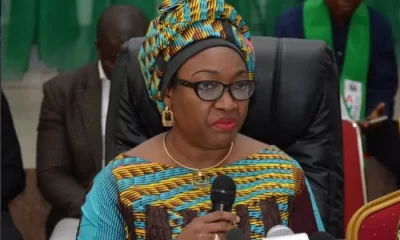Politics
How Buhari’s Coronavirus Campaign Compares With Uk’s
Nigeria’s capital Abuja and commercial capital Lagos are on lockdown(with Ogun State to follow) as part of President Muhammadu Buhari’s two-step strategy against the coronavirus pandemic.
Local and international flights have been banned (except in emergency condition) and borders are closed. There are also various forms of restrictions and social-distancing measures in many states, but generally much of the country remains relatively open, at least internally. It isn’t an Indian-style countrywide lockdown. Some palliative measures have also been announced to assist some of those affected by the crisis.
President Buhari says the primary objectives of his two-step approach are: “First, to protect the lives of our fellow Nigerians and residents living here and second, to preserve the livelihoods of workers and business owners to ensure their families get through this very difficult time (with) dignity and with hope and peace of mind”.
The strategy could simply be called pandenomics –a controlled combat of the pandemic without (hopefully) crippling an already-damaged economy. It is a strategy pursued by British Prime Minister Boris Johnson but in a different way. Mr Johnson had resisted early calls to impose draconian measures in the UK, prompting critics to accuse him of taking a laissez-faire approach to the pandemic.
Although the prime minister has eventually introduced some stringent measures as the casualty figures rise, he still maintains a liberal approach compared to what obtains in much of Europe. Restrictions are only announced where or when they become necessary. There is a countrywide ‘lockdown’ but all essential services are allowed to run unrestricted, and the police generally maintain a liberal attitude towards enforcement.
Even some non-essential businesses such as the construction industry are given free hand to operate. Construction works, road repairs and renovation of buildings are going on in many parts of the country. But even more significantly the UK airports remain open. You can still travel out or into the UK freely, even if you are the mayor of Wuhan, the birthplace of coronavirus.
There is no forced quarantine, no monitoring of your movement, no testing, no measurement of your temperature and no announcement of your corona-status on a national television. Apparently risky but that’s how the country operates.
Yet, despite this “laissez-faire approach”, the UK’s level of human losses(terrible as it certainly is) has not reached the level countries like Italy and Spain are witnessing. It is, of course, too early to make any reasonable assessment now – accurate evaluation of measures (and their consequences) regarding a pandemic of corona proportion will take years.
It is also significant to note that the UK’s approach is not without plans. Contrary to a series of criticisms about a lack of planning, the UK has actually made some good plans to fight this pandemic, and its strategy is more systematic than it appears.
The National Health Service (NHS), despite limited resources, has for months been preparing for the pandemic. It has been producing and issuing health advice and guidelines on a mass scale, which have so far proved very helpful to the public in dealing with the crisis. There’s also mass mobilisation to encourage voluntary social distancing even before it becomes an official policy.
Many public and private entities also use the window period to prepare their workers for remote working. Subtle media messaging presents ‘working from home’ as fashionable. Technology and developed infrastructure help turn it into reality. The government also makes massive economic intervention promising billions of pounds to help businesses and individuals to weather the storm. But this is not without criticisms.
Many say they are left out of the scheme while others feel the government will dole out too much borrowed monies and leave behind heavy debts for the next generation to contend with. The overall strategy itself, as stated earlier, is subjected to scrutiny from both sides of the equation, including within the Cabinet. Lockdown proponents say the measures so far taken have not gone far enough.
There are claims in the media that Home Secretary Priti Patel wanted the airports shut but the prime minister as reportedly rejected the move. Others argue that the government has already gone too far and that the measures being imposed are seriously damaging the economy and eroding civil liberties. Former Supreme Court justice Lord Sumption says some of the measures risk plunging Britain into a “police state”. He specifically criticises one police force’s (Derbyshire police) approach to the restrictions of public movement and warns against what he calls collective hysteria.
“Anyone who has studied history will recognise here the classic symptoms of collective hysteria,” he says.
“Hysteria is infectious. We are working ourselves up into a lather in which we exaggerate the threat and stop asking ourselves whether the cure may be worse than the disease.” The scrutiny (from both sides) has apparently provided the UK a condition of avoiding the extremes of draconian measures and laxity.
Buhari’s two-step strategy is also subjected to scrutiny from critics, ranging from those (such as Professor Wole Soyinka) who argue that the president has no power to impose a lockdown in any state, to those (such as former education minister Oby Ezekwesili) who say the president was too slow in his response to the pandemic.
But beyond criticisms, the effectiveness of Buhari’s and Boris’s pandenomics depends largely on how well they are implemented. Boris’s has the advantage of vast resources, well-developed economy, large and well-trained manpower, and sophisticated health system, among others.
High volume of cases is its main constraint. Buhari’s has low volume of cases (at least for now and should hopefully remain so), which is a huge advantage. But it is lacking in almost all the advantages that the UK has.
With oil price hovering around $22 a barrel, Buhari could hardly go beyond the meagre palliatives he’s promised Nigerians. Support from within and outside the country is highly needed. But there is one vital area where Nigeria could do well in fighting this pandemic, at a very low cost: public enlightenment.
Not the type run by hack mobilisers and sycophants, but awell-conceived systematic programme involving healthcare professionals and committed communications experts. This is needed urgently, and needs to be pursued vigorously.


 Politics23 hours ago
Politics23 hours agoBreaking: Prominent Nigerian Politician Is Dead(Photo)

 Top Stories7 hours ago
Top Stories7 hours agoMohbad’s toxicology result ready…what you need to know

 News7 hours ago
News7 hours agoFG to review fresh price hike of DStv, GOtv packages

 Top Stories20 hours ago
Top Stories20 hours agoRunway Mishap: ART Kicks Against Dana Suspension, Cautions Festus Keyamo

 Top Stories7 hours ago
Top Stories7 hours agoWitness Reveals How Ex-HoS, Oyo-Ita, Others Diverted ₦3 Billion To Private Companies

 News8 hours ago
News8 hours agoBlack Market Dollar (USD) To Naira (NGN) Exchange Rate Today 26th April 2024

 Entertainment7 hours ago
Entertainment7 hours agoIsraeli supermodel, Bar Refaeli accuses Bella Hadid of spreading fake news with photo of ‘starving Gaza child’

 Sports7 hours ago
Sports7 hours agoOsimhen reveals how he was pushed to become like Drogba






